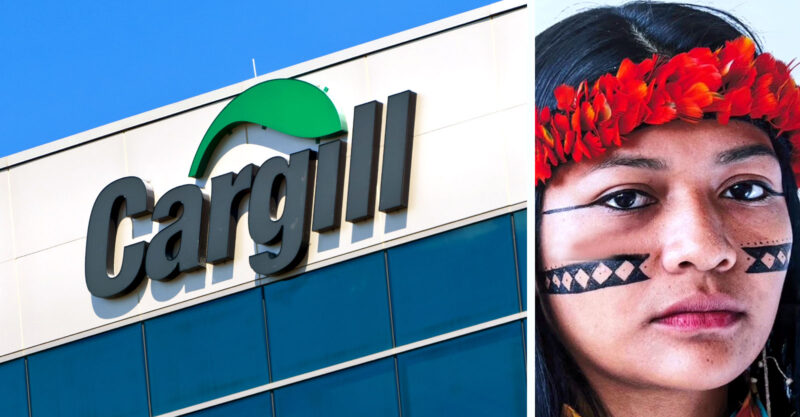Miss a day, miss a lot. Subscribe to The Defender's Top News of the Day. It's free.
The following is a letter to the Cargill-MacMillan family.
My name is Beka. I am 21 years old. I live on Sawré Muybu Indigenous territory in the Amazon forest in the state of Pará, Brazil.
I have come to the U.S. to ask the Cargill-MacMillan family to stop the destruction of our land.
My people are called the Munduruku, which means “the red ants.” We are 13,000 strong, divided into 160 communities.
Life is simple here. We plant, we harvest, we create. We learn by watching our elders. This is how we learn the riches of our culture: our stories, our forests our animals.
We have lived here in the heart of the Amazon for over 4,000 years. But now our world hangs by a thread.
Modern science tells us that our forests stabilize the climate and shape the weather. My people have always known this. Science tells us that the Amazon is nearing a tipping point, a point of no return. My people already see and suffer from these changes.
But this is not our biggest problem.
There is illegal mining, there is illegal logging. There is the theft of our land and our trees and the damming of rivers. There is the murder of those who defend the land and the brutal intimidation of our leaders. And all of these problems grow because companies like Cargill covet our land and subject it to so-called development.
We have been fighting against Cargill for a long time. It has been devastating.
Your executives tell us that Cargill is a good company and that they have pledged to end the destruction of nature. But this is not our experience.
In every region where Cargill operates, you are destroying the environment and driving out or threatening the communities who live there.
Despite your many commitments to end deforestation, the destruction has increased. Last year alone an area of tropical forest the size of Switzerland was destroyed.
And while your company publicly promises to end these practices, you only expand further into our lands.
The worst example of Cargill’s unceasing expansion is the Ferrogrão. The Ferrogrão is a 1,000-kilometer railway that Cargill wishes to cut through our lands to transport soy.
Soy is produced from the destruction of the Cerrado — a critical ecosystem south of the Amazon.
Last year the forests and savannas of the Cerrado were destroyed at a rate of 8,000 acres a day. This is an area of destruction the size of your hometown of Minneapolis every five days.
Our relatives in the Cerrado are the target of constant threats from ranchers and land-grabbers. In addition to this, they are suffering from pesticides from the crops and the contamination of their rivers and streams.
The Ferrogrão will impact 16 Indigenous territories including those of the Munduruku, Panará, Kayapó and our relatives of the Xingu Indigenous Land.
This railway will destroy 2,000 square kilometers of the Amazon forests we live in, including Munduruku lands that are currently federally protected Indigenous Territory. It will open our lands to more land grabbers, illegal miners and loggers that already invade and burn our lands and murder our people.
The Brazilian Supreme Court has ruled that the Ferrogrão is illegal, but economic interests like Cargill want to change the laws to allow for construction.
Cargill has said that anyone who opposes the Ferrogrão is “irresponsible.” We are fighting for our lives. For our land. For our cultures. For our children and grandchildren. This is not irresponsible.
What is irresponsible is for your company to make promises to end deforestation while continuing to expand into our territories and giving license to others to do the same.
You have the power to stop this.
You must cease the destruction of our forests. You must stop expanding into our territory. You must stop selling commodities from lands stolen from Indigenous peoples. You must stop the murder of the defenders of these lands.
Listen to the guardians of the Amazon and cease your destruction. We defend our lands not just for our people but for all of humanity. Your company is harming our collective future.
We wish to leave our children and grandchildren the life our ancestors gave to us. I am Munduruku, and I will never give up this fight.
Originally published by Common Dreams.
Beka Saw Munduruku, who has been called the Greta Thunberg of the Amazon, is a 21-year-old Indigenous leader from the remote Sawre Muybu village of the Brazilian Amazon.






